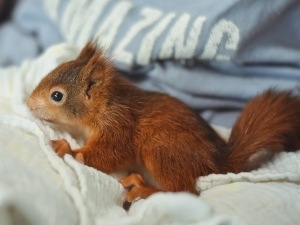
Baby squirrels are fragile creatures, they can die from the mildest of illnesses. One of the illnesses that a baby squirrel can die from is pneumonia.
Pneumonia can be treated if caught early enough, but you need to know what the signs and symptoms of pneumonia in squirrels are. This article explores pneumonia symptoms in baby squirrels.
Table of Contents
Baby squirrel pneumonia symptoms:
Baby squirrels are most likely to suffer from a condition called aspiration pneumonia, this ailment is very common among baby squirrels.
Aspiration pneumonia is a respiratory infection that develops when baby squirrels inhale formula or another fluid. If formula, or another fluid, is inhaled, it will get into the baby’s lungs and develop an infection.
This ailment is common in baby squirrels but it can develop in squirrels of all ages.
Baby squirrels can also develop this ailment if they inhale powders, sawdust from bedding, smoke, gas, aerosol sprays, and dust.
Symptoms of aspiration pneumonia
Rapid heartbeat: Squirrels, baby squirrels included, naturally have a very fast heartbeat. If you already know how fast your baby squirrel’s heart beats, and it seems faster than normal, then you should be concerned.
Difficulty breathing: If your baby squirrel is not breathing normally, seems to have shortness of breath, or has labored breathing, then you can assume that it is ill.
Change in skin color: Squirrels with aspiration pneumonia will have dark purple, bluish, or pale skin. This change in skin color happens when the squirrel’s body does not get enough oxygen. This change in skin color can clearly be seen on the pads of the animal’s feet and on their lips.
Lethargy: Baby squirrels are generally very playful and active, if your squirrel is suddenly inactive then it may have aspiration pneumonia. If the squirrel has aspiration pneumonia, then it won’t be very interested in feeding.
Sounds when breathing: If your squirrel is making clicking or wheezing sounds when inhaling, and or exhaling, this is a sign that the animal has aspiration pneumonia. You’ll be able to detect this if you put your ear against the baby’s chest and listen carefully. The clicking will sound like a valve sucking in and out, like dark Vader.
Bubbling fluids from nose or mouth: If the babies lungs are filled with fluid, some of it will come out as the baby exhales, the fluids will bubble out of the squirrel’s nose or mouth
Gurgling sounds from lungs: If you hold the baby squirrel to your ear, or use a stethoscope on it, you’ll be able to hear gurgling sounds coming from the squirrel’s lungs if it has aspiration pneumonia. The gurgling sounds mean that there is fluid in the animal’s lungs
Other symptoms: Other symptoms of aspiration pneumonia in squirrels include fever, a runny or congested nose, and sweet or foul-smelling breath
Baby squirrel pneumonia treatment:
The best thing to do for a squirrel suffering from aspiration pneumonia is to get the animal to a vet or a rehabilitation center. If you can, take the squirrel to an exotic animal vet.
The professionals at the wildlife rehabilitation center, or at the vet, will be able to treat your baby squirrel
Sucking the fluid out:
One of the ways that professionals help squirrels suffering from pneumonia is to suck the fluids out of the squirrel’s airways.
The professionals will use a nasal syringe to do this. The nasal syringe will suck out any blood and mucus that is stuck in the squirrel’s airways.
Medication:
Antibiotics are the first line of defense against pneumonia in squirrels, the antibiotics will clear up the infection in your baby squirrel’s lungs and get it back to being healthy and normal again.
Your vet can prescribe your squirrel some antibiotics. Antibiotics that the vet may prescribe include Baytril, or Bactrim, also called sulfatrim.
Depending on your vet’s views on penicillin-based antibiotics, like Clavamox or amoxicillin, they may or may not prescribe it. There is an ongoing debate on whether these antibiotics should or should not be given to squirrels.
Antibiotics can cause the squirrel to develop diarrhea, this is because the antibiotics will kill off not only the bad bacteria, but they will also kill off the good bacteria in your squirrel’s body as well.
Your vet will likely offer medications such as probios, benebac, or lactobacillus to treat this side effect.
At home:
Once you get the squirrel home, you’d need to keep the animal in a quiet place and allow it to recover, also make sure to keep the animal well hydrated and keep it in a dust-free, smoke-free and clean environment.
FAQ’s:
What if my baby squirrel feels cold?
If your baby squirrel feels cold you’d need to warm the animal up, there are a variety of ways to do this.
You can give the squirrel a heat source, this being uncooked rice in a sock microwaved for one minute, you could also use a plastic bottle filled with hot tap water, wrapped in a face cloth or tea towel, you could also use a heating pad set on low.
Cupping the animal in your hands and putting the animal against your skin can also help to warm the squirrel up.
How to hydrate a baby squirrel?
You can make a homemade oral hydration solution by mixing together 3 teaspoons of water, and one teaspoon of salt into four cups (one quart) of warm water.
Get the water to a comfortable warm temperature before giving it to the squirrel. You’d need to warm the animal before you give the hydration solution.
If you enjoyed this article then you may also be interested in other squirrel related articles. Here are some articles that you may be interested in: Baby Squirrel Gasping For Air, Why Did My Squirrel Suddenly Die?

